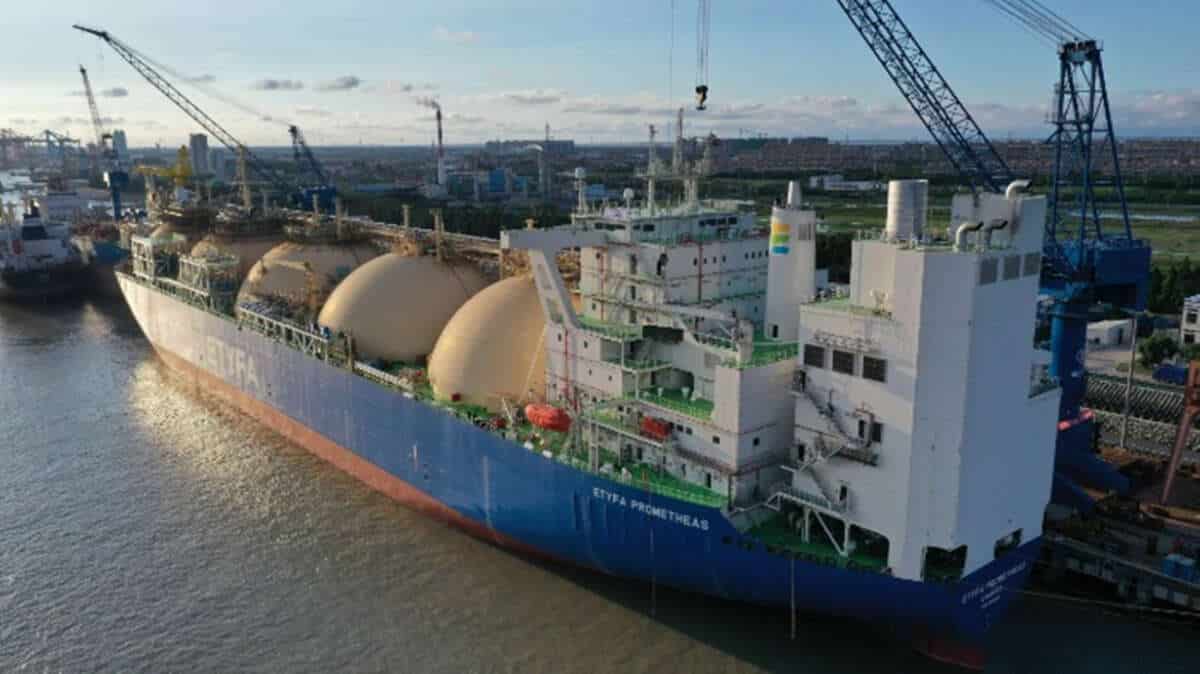The Chinese-led consortium tasked with building the liquefied natural gas (LNG) import terminal at Vasiliko is open to exploring alternative agreements beyond the scope of the current contract, Energy Minister Geroge Papanastasiou said on Tuesday.
Speaking after the House energy committee met behind closed doors, the minister said the two contracting parties, Etyfa (Natural Gas Infrastructure Company) and the Chinese company CPP, have shown a willingness to reach a separate agreement regarding the completion timeline of the terminal.
“All alternatives are on the table” and are under discussion between the contracting parties, the minister stressed.
Papanastasiou said that “on the one hand, there is a contract that we insist should be honoured by the contracting parties and, on the other hand, there is a willingness of the two parties to reach a different agreement, but this will depend very much on the two parties.”
He explained that a separate deal would see the completion horizon of the terminal, “not necessarily in the context of the specific relationship that comes from the contract, but possibly outside of the contract”. The remark pointed to a possible termination of the contract, and the continuation of construction with a different contractor.
Regarding the floating, storage and regasification unit (the Fsru), Papanastasiou said it is “completed”, adding that there are ongoing consultations with the contractor and the maritime certifier for certification. The vessel “may sail from China to Vasiliko, provided that all documents are in place and all arrangements are made for the departure of the ship to Vasiliko”.
The House energy committee’s closed-door session primarily focused on the progress of the LNG import terminal and the Great Sea Interconnector project. Papanastasiou’s request for confidentiality stemmed from sensitive arbitration issues with CPP Metron currently under review at the arbitration court in London.
CPP Metron, the contractor responsible for constructing the onshore LNG terminal, has filed a claim for additional compensation from the Republic of Cyprus amounting to €200 million.
Committee chairman Kyriakos Hadjiyiannis stressed the importance of confidentiality, warning that even a minimal leak could have significant legal implications against the public interest.
“Any information that is disclosed could be used in the ongoing arbitration cases,” he said.
Sources knowledgeable about the matter later told the Cyprus Mail that there are two main issues outstanding. First, the Chinese-led consortium is dragging its heels on construction works at the onshore LNG terminal at Vasiliko.
“They [the Chinese] are doing some work at the terminal, but at a very slow pace, and meanwhile work on the jetty is almost at a standstill,” they said.
Secondly, the Fsru in Shanghai is finished, but the Chinese side is understood to be coming up with ways to delay its release.
“It’s almost as if they’re holding the ship to ransom,” the sources told us.
The Frsu needs two certifications: one as an LNG carrier, the other as a regasification unit. Once the former certificate is secured, the vessel would be able to set sail for Cyprus. The regasification certificate could be secured subsequently, once the Fsru is hooked up to the land-based infrastructures in Vasiliko.
“Essentially the Cypriot side wants to ‘free’ the ship so that it comes into Etyfa’s possession. This might take a separate deal between Etyfa and CPP, and talks about this are underway.”
They added pointedly: “One way or another, the Cypriot side wants the whole dispute resolved within the month of June.”
As the energy minister said earlier in parliament, the Cypriot side regards the Fsru as the key component (and asset) of the entire project. Papanastasiou gave the vessel a 75 per cent weighting in terms of importance, 15 per cent to the jetty, and 10 per cent to the onshore facility at Vasiliko.
The minister was also asked to comment on media reports that the Chinese side is asking for “more money” to let the ship leave Cosco’s shipyard in Shanghai. He said only that he was aware of these reports, adding that “everything is on the negotiating table.”
Cyprus signed the contract for the LNG project back in December 2019. The whole project should have taken 22 months to complete, however, the contractor had halted all work at the land-based LNG facilities at Vasiliko, citing the non-payment of invoices by Cyprus.
The consortium, is also seeking €200 million in additional compensation through arbitration proceedings in London. This claim comes despite the original contract being awarded for €500 million, with current expenses already exceeding €542 million.
The Cyprus Mail reported more than two years ago how the Chinese-led contractor was not up to the task of managing an LNG project of this scale or complexity.
Switching to natural gas for power generation is crucial for Cyprus, as it would cut carbon dioxide emissions by 30 per cent, potentially saving the island tens of millions of euros in greenhouse gas penalties.








Click here to change your cookie preferences